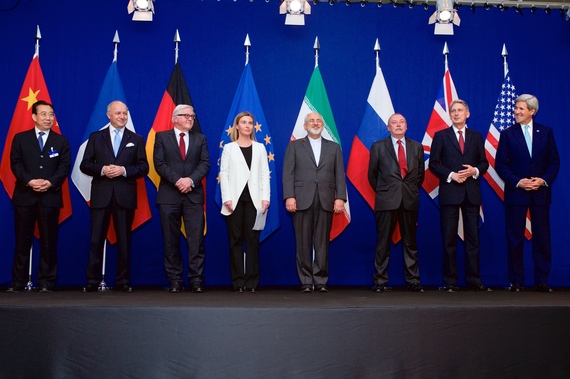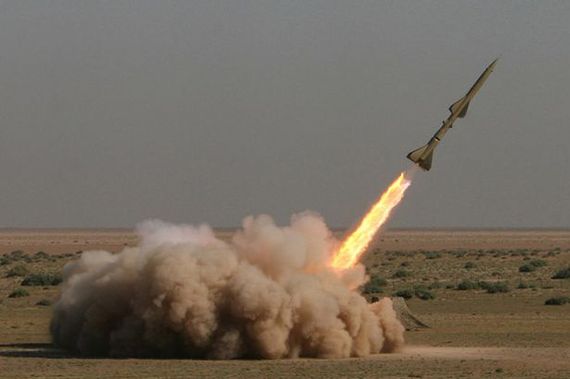On Saturday January 16, The U.N.'s International Atomic Energy Agency announced that the government of the Islamic Republic of Iran had met the requirements imposed by the "P5 +1 Nuclear Agreement" that it had concluded back in June of 2015.
Per that agreement, Iran had dismantled more than 12,000 uranium enrichment centrifuges. The core of the Arak heavy water reactor had been decommissioned, preventing its use for the production of plutonium. Iran has agreed that the reactor would be redesigned so that it could not be used to produce weapons grade plutonium. In addition, some 25,000 pounds of spent nuclear fuel, roughly 98% of Iran's stockpile, and including all of the fuel that had been enriched to 20% or more U 235, had been sent to Russia.
Almost immediately, the European Union and the United States announced that the sanctions that had previously been imposed on Iran were being lifted. Virtually all of the sanctions imposed by the E.U. were eliminated. Some, but not all, of the U.S. sanctions were also rescinded.
The key sanctions, however, were now history. Financial assets valued at between $100 billion and $150 billion have been released to Tehran. Additionally, trade sanctions that had limited Iranian exports of oil, and which had embargoed Iranian imports of a broad number of goods, were also lifted. Iran is now free to participate in the global trade of nations without any restrictions.
Now what?
In the U.S., the Republican contenders for their party's nomination roundly criticized the lifting of sanctions -- promising to "rip up the agreement" should they be elected president. Although in theory, the mechanism exists to re-impose sanctions should Tehran violate the terms of the nuclear agreement; from a practical standpoint this seems highly unlikely.
Tehran will move quickly to take control of its overseas financial assets. It will hardly return them should sanctions be re-imposed in the future. Iran also announced plans to ratchet up its oil production from two million BOPD to three million BOPD, sending further shock waves into the currently unstable international petroleum market.
The essence of the agreement that Iran signed with the P5 +1 committee was that it would effectively defer its current nuclear development program for at least the next ten years in return for the lifting of the economic sanctions that had been imposed by the U.S. and the E.U.
The "nuclear agreement" did not restrict Iran's ability to continue the development of nuclear-capable ballistic missiles. Such tests were banned by U.N. Security Council resolution 1929 passed in 2010. Tehran, however, has tested such missiles, in violation of that resolution, at least eight times since 2010. The most recent tests were on October 10 and November 21, 2015.
If Iran truly was close to announcing the acquisition of nuclear weapons, then the agreement will defer the development and deployment of such weapons, assuming that Iran does not cheat on the agreement, for at least another decade.
If on the other hand, Tehran was still a way off from developing such weapons, and in particular from the development of warheads and of the intermediate and long-range ballistic missiles capable of delivering them, then the Obama administration and the E.U. traded sanctions in return for a capability that Tehran did not yet really possess.
Based on my own conversations with a number of intelligence agencies around the world, I do not believe that Iran was anywhere close to developing feasible nuclear weapons. In short, Tehran gave up a capability that it didn't have in return for the very real relief of sanctions and access to a financial windfall of frozen financial assets.
The immediate impact of the lifting of sanctions is that Iran will gain immediate access to Western industrial technology. In particular, this includes oil field technology that it desperately needs to revitalize many of its aging petroleum fields as well as to expand production from existing fields and develop newly discovered oil deposits.
The National Iranian Oil Company (NIOC) is currently producing approximately two million BOPD a day. It has announced plans to immediately increase production by another 500,000 BOPD, and to further increase production by an additional 500,000 BOPD, to a total of three million BOPD within another six months.
In addition, NIOC has stockpiled an estimated 25 million to 30 million barrels of oil in tankers in the Persian Gulf and in onshore storage facilities that is available for immediate shipment. The roughly one billion dollars worth of petroleum, however, is today worth a fraction of what it would have brought in just 24 months ago.
Increasing oil production to three million barrels a day will not be easy. It is unlikely that NIOC will meet its goal of three billion BOPD anytime soon. The more modest target of 2.5 million BOPD is far more likely. Even then, the increase in production, and the windfall from the sale of its current stockpile, will still leave NIOC with far less revenue than it was earning just a few years ago.
Far more significant, will be the release of over 100 billion dollars in frozen financial assets. The immediate boost to its finances will help, although, long term, it will not relieve the serious financial pressures that the Tehran government is currently finding itself in.
Tehran's assistance to the Assad government in Syria is estimated to currently running in excess of ten billion dollars a year. Add to that the cost of Iran's support for Iraq's Shiite militias and assorted organizations from Hezbollah to various other militant Shiite organizations, and the bill from Tehran's foreign adventures is beyond its current capacity to afford. The recently released foreign funds will help bridge that gap for the next few years, but without a substantial recovery in petroleum prices, it will not solve Tehran's long-term budget gap.
Time will tell whether the nuclear agreement with Iran will prove to have been a wise one. I suspect that future historians will not wax as sanguine about the agreement as President Obama or his Secretary of State John Kerry do.
The fact is, that notwithstanding other U.N. Security Council resolutions, the agreement does nothing to curb Tehran's further development and testing of long range ballistic missiles. Nor did it force Iran to abstain from continuing its funding of militant organizations or its efforts to politically destabilize its Sunni neighbors.
The tragedy is that the combination of economic sanctions and crashing petroleum prices were finally putting sufficient pressure on Tehran to force far more meaningful and wide-ranging concessions from the Iranian government. Patience would have rewarded the U.S. and its E.U. allies with a far better agreement and a much more compliant and responsible Iran. In his rush to create his foreign policy legacy, President Obama impatiently played a winning hand badly. It is a legacy we will come to regret. We will all be the losers for it.


